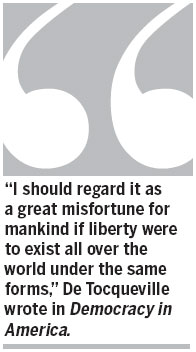Everything changed, but nothing differed
Updated: 2013-02-25 07:57
By David Gosset (China Daily)
|
|||||||||||

The Old Regime and the Revolution, written by the French thinker Alexis de Tocqueville in 1856, is now a bestseller in China, a phenomenon that can be explained in three ways.
First, the book published during the reign of Napoleon III is a masterpiece.
Second, if The Old Regime and the Revolution is one of the greatest analyses of a key historical event, the French Revolution, it also contains timeless wisdom. While a lot of literature pretends to anticipate the future state of the world, De Tocqueville's lucidity is sobering: "Philosophers and statesmen may learn a valuable lesson of modesty from the history of our revolution, for there never were events greater, better prepared, longer matured, and yet so little foreseen."
Third, some observations of the book have a certain degree of relevance for today's Chinese readers. In the chapter on the relative economic prosperity of Louis XVI's reign, De Tocqueville reminds us that "revolutions are not always brought about by a gradual decline from bad to worse", and he also states: "Though the king used the language of a master, he was, in reality, the slave of public opinion."
However, it would be fallacious - and certainly not Tocquevillian - to infer from apparent similarities that China is on the verge of major political convulsions.
In the mold of Aristotle and Montesquieu, De Tocqueville fully appreciates the importance of the historical and cultural context, and concludes his inquiry on the causes of the French Revolution with a reference to the uniqueness of the country which generated it: "I cannot help thinking it is more extraordinary than any of the events of its history."
More importantly, the features surrounding the socio-political rupture that is the topic of the book have only a superficial resonance in post-Deng Xiaoping China; they are not the harbingers of upheavals to come but they operate as a framework to better comprehend China's recent past.
It is the Xinhai Revolution in 1911 that marked the end of more than 2,000 years of monarchic dynasties, then the revolution in 1949, which constitutes a discontinuity comparable with the French Revolution.
De Tocqueville was not merely reporting the ups and downs of political vicissitude, he conceptualized the transition between two worlds, the fall of aristocratic values and the rise of equality, a profound transformation whose dramatic dynamics were also beautifully captured by the Italian writer Giuseppe Tomasi di Lampedusa in The Leopard.
What de Tocqueville called the "three truths" in his preface to The Old Regime and the Revolution offer, in retrospect, a perspective on 20th century China. Republican China has certainly witnessed the destruction of the Chinese aristocracy - the first "truth" - and the establishment of the equality of conditions among the individuals that is the mark of a democratic society.
But the two other "truths" that coexist with the inevitability of the aristocracy's ruin manifested themselves in the Chinese environment: Without aristocracy, despotism imposes itself more easily, and "despotism can never be so injurious" as in societies of this nature.
By way of warning, De Tocqueville also wrote: "I do not hesitate to affirm that the common level of hearts and minds will never cease to sink so long as equality and despotism are combined." He theorized about what, in the Chinese context, would become the tragedy of the "cultural revolution" (1966-76): the unchecked despotism over equal but isolated individuals, the command of an emperor without the imperial hierarchy, rites and customs to channel and moderate its dominance.
If the current popularity of the book in China should not be interpreted as a sign of an impending Chinese revolution, one should not stop reflecting on the best ways to preserve liberty in the midst of equalizing globalization.
De Tocqueville understood the principles and consequences of a democratic era, and he adjusted to a world where "everything changes but nothing differs". Still, he lived with a nostalgia for the aristocratic values, with a poignant longing for a world where "nothing changes, but everything differs".
"I should regard it as a great misfortune for mankind if liberty were to exist all over the world under the same forms," he wrote in Democracy in America.
Just as China finds itself attracted to De Tocqueville's insight, there is no doubt that China's 21st century efforts to invent new forms of political modernity would have been a most extraordinary source of intellectual stimulation for the French aristocrat.
The author is director of the Academia Sinica Europaea at China Europe International Business School, and founder of the Euro-China Forum.
Related readings:
Coutinho tipped to lead Reds' revolution
The silent revolution inside IMF
A revolution is here, and clean energy is the spark
China and the shale gas revolution
China urged to seize on new tech revolution
Today's Top News
Police continue manhunt for 2nd bombing suspect
H7N9 flu transmission studied
8% growth predicted for Q2
Nuke reactor gets foreign contract
First couple on Time's list of most influential
'Green' awareness levels drop in Beijing
Palace Museum spruces up
Trading channels 'need to broaden'
Hot Topics
Lunar probe , China growth forecasts, Emission rules get tougher, China seen through 'colored lens', International board,
Editor's Picks

|

|

|

|

|

|





